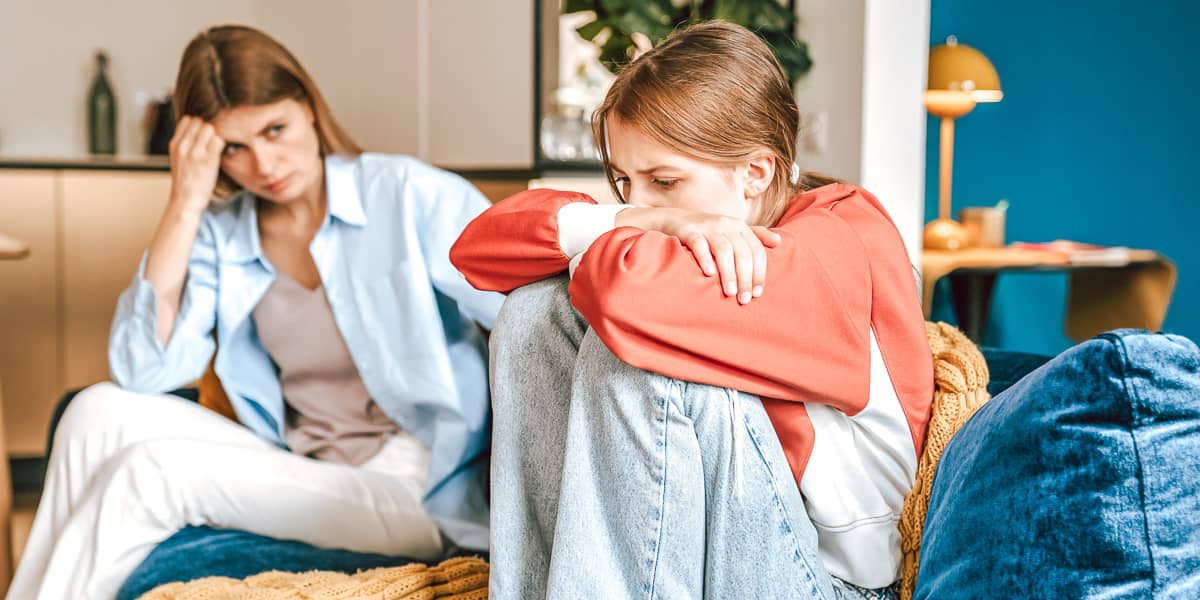How Many Unhappy Spouses Stay Together for the Kids?

- Parental unhappiness impacts the kids
- The case for staying together
- The case for breaking up
- How many couples stay together for the kids?
- Does staying together for the kids benefit them?
- How can parents minimize the impact of their unhappiness on their kids?
- References
You and your spouse are devoted and loving parents. Marriage partners? Not so much. While you’ve considered your options, divorce being one of them, you’ve also considered how it would affect your kids.
You know that modeling a good relationship and self-care are essential for your kids’ well-being, but you also know that divorce carries its own burdens. So, you face a dilemma: Do you stay in your marriage and sacrifice your own happiness, or do you take your chances on divorce?
Parental unhappiness impacts the kids
Research consistently shows that kids are highly sensitive to the emotional state in the home. Living in a household filled with conflict or palpable unhappiness can have a significant effect on their emotional equilibrium. Living with ongoing tension, even if it’s not overt, can lead to all sorts of issues for kids including anxiety, depression, and even an inability to form their own happy and healthy relationships as adults.
The case for staying together
Given that information, should you stay together for the kids? Some studies suggest that children living in two-parent homes fare better than ones who experience their parents’ divorce. After all, kids need a sense of stability and safety. There's a slew of data showing that kids of divorce can develop feelings of fear and anxiety, academic problems, risk-taking behavior, substance abuse problems, and other negative behaviors.
Yes, the classic two-parent home offers more financial stability and shared parental responsibility. Theoretically, it also offers kids a more stable model of security and commitment. But when parents aren’t happy, does it really feel that stable and safe to the kids?
The case for breaking up
Interestingly, there’s also a body of evidence suggesting that children are better off and can actually thrive when their unhappy parents separate or divorce.
While the short-term effects of divorce can be disruptive, long-term, kids can benefit from seeing their parents go on to be happier and healthier individuals. Parents who are committed to their kids' well-being and their roles as co-parents can still provide them with the love, stability, and financial support they could potentially have had in a household where both parents lived (happily) together.
How many couples stay together for the kids?
While the two-parent stable household is a lovely ideal, it’s not the reality in many marriages. Consequently, the decision to stay in an unhappy relationship for the sake of the kids is an age-old dilemma.
Given that nearly half of all marriages end in divorce today, how many out there remain unhappily married just for the sake of the kids? While there’s no hard data, the results of some more casual polls suggest a lot. Depending on where you get your information, estimates suggest that a third to nearly a half of married respondents with kids report staying together out of concern for their children’s welfare. While the underlying reasons vary from financial to feeling “trapped” by their parental duties, it seems many parents have chosen to forgo their personal happiness for their kids.
But at what cost?
Does staying together for the kids benefit them?
That depends. In high-conflict settings, it can be detrimental for kids to be caught in the middle. But when parents are dedicated to minimizing conflict, staying respectful, and maintaining a loving atmosphere for their kids, staying together can be beneficial.
It’s important to remember that kids are masters at picking up the emotional current of the household. Bottom line: It will be challenging for parents to keep their unhappiness under wraps. In most cases, the kids will know.
How can parents minimize the impact of their unhappiness on their kids?
Even if you and your spouse are unhappy in your relationship, we understand that your first priority is your children’s well-being.
- Stay mindful of the things you do and say and how your children could perceive it. Kids will pick up on even the most subtle hostility.
- Shield your kids from conflict. Don’t expose them to your arguments, and keep any conversations about your issues out of earshot.
- Maintain as stable an environment as possible. Keep up routines and a sense of normalcy.
- Spend quality time with the kids. Remind them how much they’re loved.
- If you find yourself struggling to keep a peaceful and cooperative atmosphere, get professional help.
So, does it benefit children for parents to stay together even if they’re unhappy in their marriage?
Bottom line: It’s up to parents to evaluate their ability to maintain a healthy and respectful relationship and avoid conflict in the home. Unfortunately, the emotional toll of their unhappiness can override any sense of doing the “right thing” by staying together for the sake of the kids.
Fortunately, kids of divorce are usually resilient and adaptable when their parents are mindful of how they navigate their own relationships.
At Hello Divorce, we are here to support you and your kids through the divorce process and beyond with affordable online divorce plans, a network of professional services, and a library of resources to help educate and inform you as you go. Schedule a no-cost 15-minute phone call to see how we can help.
FAQs
Do many unhappy spouses stay together for the kids?
Yes. Many couples delay separation for children, finances, or fear of conflict. The key question is whether the home can stay low-conflict and stable while you work on the relationship.
Is staying together always better for children?
Not always. Kids do best with safety, routines, and low conflict. Chronic tension, contempt, or control can be more harmful than a well-planned, low-conflict separation.
What signs suggest staying is hurting the family?
Constant hostility, fear, stonewalling, or emotional withdrawal; kids showing anxiety, school problems, or caretaking behaviors; or any abuse. These point to change being necessary.
Can we try structured changes before separating?
Yes. Boundaries, a written house plan, therapy, and trial separations in-home can reduce conflict and test whether conditions improve for everyone.
If we do separate, how do we protect the kids?
Keep routines steady, exchanges calm, and communication businesslike. Tell kids together, avoid blame, and set a predictable parenting schedule early.
Step-by-Step: How to Decide Whether to Stay Together for the Kids
Screen for safety first
If there is violence, coercive control, or serious substance misuse, prioritize safety planning and professional help before any joint decision.
Map the child’s needs and current stress
Note sleep, school, health, and mood. Track when conflict rises and how it affects your child’s day.
Set a 60–90 day house plan
Agree on boundaries, division of labor, and conflict rules (no yelling, no digs). Use written schedules to stabilize routines.
Try targeted support
Engage couples therapy or discernment counseling; consider individual therapy or parenting coaching focused on de-escalation.
Evaluate with data, not wishful thinking
After the trial period, review notes on conflict frequency, child wellbeing, and your ability to maintain respect and stability.
Plan next steps
If things improve, renew the plan. If not, outline a low-conflict separation: housing, budget, and a predictable parenting schedule.
Communicate to kids with care
Share a simple, united message, avoid blame, and explain what stays the same. Keep routines steady.
You said:
Suggested: Understanding and Protecting Kids’ Mental Health in Divorce
References
The impact of family structure on the health of children: Effects of divorce* (November, 2014). American College of PediatriciansThe adjustment of children with divorced parents: a risk and resiliency perspective. (January, 1999). Journal of Child Psychology and Psychiatry.



